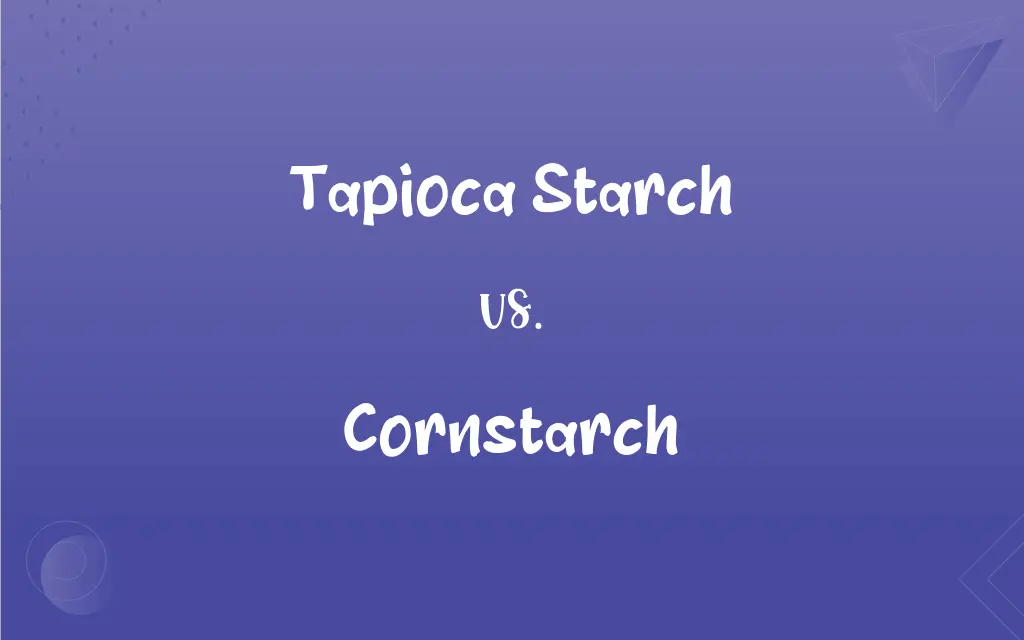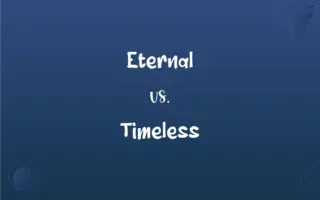Tapioca Starch vs. Cornstarch: What's the Difference?
Edited by Aimie Carlson || By Harlon Moss || Published on January 24, 2024
Tapioca starch is extracted from cassava roots and is gluten-free, while cornstarch is derived from corn kernels and is a common thickening agent.

Key Differences
Tapioca starch is extracted from the roots of the cassava plant, a staple in many tropical countries. Cornstarch, in contrast, is derived from the endosperm of corn kernels, predominantly grown in temperate regions.
Tapioca starch contributes a chewy texture and is often used in puddings and gluten-free baking. Cornstarch, known for its neutral flavor, is widely used as a thickening agent in sauces, gravies, and soups.
Tapioca starch is almost purely carbohydrate, offering minimal protein or nutrients. Cornstarch, while also high in carbohydrates, sometimes contains a small amount of protein and fiber.
Tapioca starch is naturally gluten-free, making it suitable for those with gluten sensitivities. Cornstarch, although generally gluten-free, can sometimes be cross-contaminated in processing facilities.
Tapioca starch can withstand prolonged cooking and freezing, maintaining consistency, whereas cornstarch may break down with overcooking or freezing, causing sauces to become thin.
ADVERTISEMENT
Comparison Chart
Source
Cassava roots
Corn kernels
Culinary Use
Puddings, gluten-free baking
Thickening sauces, gravies
Texture
Chewy
Smooth, thickens well
Nutritional Content
High in carbohydrates, low in nutrients
Carbohydrates, some protein and fiber
Allergen Status
Gluten-free
Generally gluten-free
ADVERTISEMENT
Cooking Stability
Good for prolonged cooking and freezing
Can break down with overcooking or freezing
Tapioca Starch and Cornstarch Definitions
Tapioca Starch
Tapioca starch is used in gluten-free baking.
The recipe called for tapioca starch to improve the texture of the bread.
Cornstarch
Cornstarch is a common thickening agent.
I used cornstarch to thicken the gravy.
Tapioca Starch
Tapioca starch is key in making puddings.
Tapioca starch gave the pudding its signature chewy texture.
Cornstarch
Cornstarch has a neutral flavor.
Cornstarch doesn't alter the taste of the dish.
Tapioca Starch
Tapioca starch acts as a binding agent in recipes.
Tapioca starch helped bind the ingredients in the veggie burger.
Cornstarch
Cornstarch is derived from corn.
Cornstarch is a versatile product of corn.
Tapioca Starch
Tapioca starch is a gluten-free thickening agent.
I used tapioca starch to thicken the fruit pie filling.
Cornstarch
Cornstarch is used in baking.
Cornstarch was added to the cake to soften the flour's texture.
Tapioca Starch
Tapioca starch comes from cassava.
Tapioca starch is a popular ingredient in tropical cooking.
Cornstarch
Cornstarch is a staple in cooking.
Cornstarch is essential for achieving the right sauce consistency.
Cornstarch
Starch prepared from corn grains, used industrially and as a thickener in cooking.
Cornstarch
A very fine starch powder derived from corn (maize) used in cooking as a thickener, to keep things from sticking, or as an anti-caking agent.
Cornstarch
Starch made from Indian corn, esp. a fine white flour used for puddings, etc.
Cornstarch
Starch prepared from the grains of corn; used in cooking as a thickener
FAQs
What is tapioca starch made from?
Tapioca starch is made from cassava roots.
What is the primary use of cornstarch in cooking?
Cornstarch is primarily used as a thickening agent.
Is tapioca starch gluten-free?
Yes, tapioca starch is naturally gluten-free.
What texture does tapioca starch add to food?
Tapioca starch adds a chewy texture to food.
Is cornstarch suitable for long-cooking dishes?
Cornstarch may break down in long-cooking dishes.
Can cornstarch be used in gluten-free recipes?
Yes, cornstarch is generally gluten-free and can be used in such recipes.
What are the health benefits of tapioca starch?
Tapioca starch is low in nutrients but good for those needing gluten-free options.
Can tapioca starch replace cornstarch in recipes?
Yes, tapioca starch can often replace cornstarch, especially in gluten-free cooking.
Is cornstarch a good option for thickening clear sauces?
Yes, cornstarch is excellent for thickening clear sauces.
How does tapioca starch behave when frozen?
Tapioca starch maintains its consistency well when frozen.
Can cornstarch be used in baking?
Yes, cornstarch is often used in baking to soften textures.
Are there any allergens in cornstarch?
Cornstarch is usually allergen-free, but cross-contamination can occur.
Does cornstarch have a taste?
Cornstarch has a neutral taste.
Does cornstarch have any health benefits?
Cornstarch is low in fat and protein but doesn't offer significant health benefits.
What dishes are tapioca starch commonly used in?
Tapioca starch is commonly used in puddings, gluten-free baking, and as a thickener.
How does cornstarch affect the texture of sauces?
Cornstarch gives sauces a smooth and thick texture.
Is tapioca starch easy to digest?
Yes, tapioca starch is generally easy to digest.
Is cornstarch nutritious?
Cornstarch is high in carbohydrates but low in other nutrients.
Can tapioca starch be used in savory dishes?
Yes, tapioca starch can be used as a thickener in savory dishes.
How should tapioca starch be stored?
Tapioca starch should be stored in a cool, dry place.
About Author
Written by
Harlon MossHarlon is a seasoned quality moderator and accomplished content writer for Difference Wiki. An alumnus of the prestigious University of California, he earned his degree in Computer Science. Leveraging his academic background, Harlon brings a meticulous and informed perspective to his work, ensuring content accuracy and excellence.
Edited by
Aimie CarlsonAimie Carlson, holding a master's degree in English literature, is a fervent English language enthusiast. She lends her writing talents to Difference Wiki, a prominent website that specializes in comparisons, offering readers insightful analyses that both captivate and inform.






































































